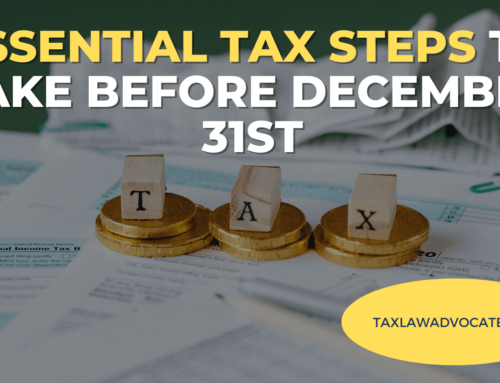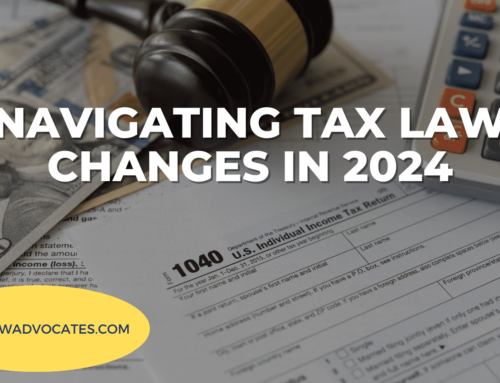In recent years, the world of cryptocurrency has exploded in popularity, with Bitcoin, Ethereum, and NFTs making headlines and drawing the attention of investors worldwide. As this digital asset class continues to grow, so does the scrutiny from tax authorities. In this blog post, we’ll explore the regulation and taxation of cryptocurrency in the United States, shedding light on the key aspects you need to know to stay compliant with the law. Plus, we’ll introduce you to Tax Law Advocates, a valuable resource for navigating the complex world of crypto taxes.
Are all crypto transactions taxable?
Not every crypto transaction is taxable. To determine whether a specific activity involving cryptocurrency is taxable, it’s essential to understand what qualifies as a taxable event.
What crypto transactions are taxable?
Taxable events in the world of cryptocurrency include:
- Selling digital assets for cash: When you sell your cryptocurrency for traditional fiat currency (e.g., USD), this is a taxable event.
- Trading one type of digital asset for another: Exchanging one cryptocurrency for another, like trading Bitcoin for Ethereum, is also taxable.
- Using crypto as payment: If you use cryptocurrency to buy goods or services, it counts as a taxable event. For example, if you purchase a cup of coffee with Bitcoin, you need to report this.
- Mining or staking crypto: When you receive cryptocurrency as a reward for mining or staking, it is considered taxable income.
- Receiving airdropped tokens: Airdrops, where you receive free tokens, are taxable.
- Getting paid in crypto: If you receive your salary or income in cryptocurrency, it is subject to taxation.
- Receiving interest or yield in crypto: Earning interest or yield on your crypto holdings is also taxable income.
However, some non-taxable crypto activities include buying digital assets with cash, transferring crypto between your wallets or accounts, gifting cryptocurrency (within certain limits), and donating cryptocurrency, which can be tax-deductible.
What is cost basis?
Cost basis is a crucial concept in cryptocurrency taxation. It refers to the original purchase or acquisition price of a cryptocurrency. For example, if you buy 1 Bitcoin for $10,000, your cost basis for that Bitcoin is $10,000. Cost basis is used to calculate capital gains or losses when you sell or dispose of your cryptocurrency.
Tracking cost basis in the crypto world can be challenging due to the movement of assets across different wallets and exchanges. TaxBit, in partnership with industry leaders, is working on solutions to simplify this process and ensure accurate tax reporting.
What is the Form 8949?
Form 8949 is a tax form used to report the sales and other dispositions of capital assets, including cryptocurrency. On this form, you provide details about the number of units acquired, acquisition and disposal dates, cost basis, and any resulting capital gains or losses. The tax treatment of capital gains depends on whether the assets were held for more than one year (long-term) or one year or less (short-term).
How to determine crypto gains or losses
Calculating gains or losses from cryptocurrency transactions depends on the value of the asset at the time of disposal compared to its cost basis. The IRS provides guidance on acceptable cost-basis methods, primarily First In, First Out (FIFO) and Specific Identification.
What is FIFO (first in, first out)?
FIFO is a method of assigning the cost basis, where the oldest units of crypto you own are sold or disposed of first. It’s a straightforward approach and can be used by pooling all your accounts or preparing separate FIFO calculations for each wallet or account.
What is Specific Identification?
Specific Identification allows you to select which particular cryptocurrency unit is being disposed of in a transaction, potentially minimizing gains or obtaining losses. This method is beneficial in situations where you want to optimize your tax liability. However, it comes with specific record-keeping requirements.
Tax forms issued by cryptocurrency exchanges
Cryptocurrency exchanges may issue various tax forms to users, including:
- Form 1099-MISC: This form reports ordinary income from activities like crypto earnings, referral bonuses, staking, mining, airdrops, and more. If you’ve earned $600 or more in crypto income, you’ll likely receive a 1099-MISC from the platform.
- Form 1099-B: Traditionally used by financial brokerages, this form is now becoming relevant in the crypto world. It reports the disposal of capital assets, helping users determine their tax liability.
- Form 1099-DA: This form is part of the Infrastructure Investment and Jobs Act and is expected to be required for digital asset brokers. It will provide information on transfers and the original cost basis for cryptocurrency transactions.
How are exchange and network transfer fees taxed?
When you engage in cryptocurrency transactions, fees are often associated with them. The tax treatment of these fees depends on whether they are directly connected to the acquisition or disposition of cryptocurrency. Fees related to buying or selling crypto on an exchange can be taken into account for tax purposes. However, fees for transferring crypto between accounts or wallets typically do not provide tax relief.
What is the tax rate for crypto?
In the United States, cryptocurrency taxation distinguishes between ordinary income and capital gains. If you receive cryptocurrency as payment for goods or services or through an airdrop, it is taxed as ordinary income, subject to your regular income tax rate. If you sell or dispose of cryptocurrency, the resulting gain or loss is considered a capital gain or loss.
The tax rate for capital gains depends on your holding period and income level. Long-term capital gains, for assets held for more than one year, receive preferential tax treatment, with rates of 0%, 15%, or 20% depending on your taxable income and filing status.
What is a tax loss carryforward?
If your capital losses exceed your capital gains in a tax year, you can deduct up to $3,000 of those losses from your ordinary income. Any remaining losses can be carried forward to offset gains in future years. This mechanism helps investors manage their tax liability when they experience capital losses in the crypto market.
How can investors offset capital gains with capital losses?
Offsetting capital gains with capital losses is a strategy known as tax-loss harvesting. To use this strategy effectively, consider the holding period of your assets. Short-term losses can offset short-term gains, and long-term losses can offset long-term gains. Any losses exceeding $3,000 can be carried forward to future tax years.
How are crypto taxes enforced?
The IRS enforces cryptocurrency taxes by reviewing the information provided on tax returns. They pay close attention to individuals who receive Form 1099 from exchanges, cross-referencing this information with what is reported on tax returns. To avoid penalties and audits, it’s essential to provide honest and accurate information on your tax return, especially when dealing with cryptocurrency.
Other crypto tax considerations
Here are some additional tax considerations related to specific crypto activities:
- Crypto Staking or Mining: Staking rewards and mining income may be taxed as income or ordinary income. However, the tax treatment can vary depending on factors like network upgrades and the timing of fund unlocking.
- Crypto Airdrops or Hard Forks: Airdropped or hard-forked cryptocurrencies are generally considered ordinary income for tax purposes.
- Crypto Debit Card Payments: Spending cryptocurrency with a debit card can be a taxable event, either as a capital gain or loss, depending on the price at the time of the purchase.
- Crypto Bankruptcies: In cases of crypto exchange bankruptcies, taxpayers may claim deductions once the amount of any payout is determined with reasonable certainty.
- Crypto Gifts and Donations: Gifting cryptocurrency to friends or family is not taxable, while donating cryptocurrency to eligible charities may offer additional tax benefits.
- Crypto-to-Crypto Transactions: Exchanging one cryptocurrency for another is a taxable event, requiring you to report any capital gains or losses.
- NFTs: Non-fungible tokens (NFTs) are considered digital assets and are subject to capital gains or ordinary income tax, with potential variations based on IRS guidance.
Navigating the complex landscape of cryptocurrency taxation can be challenging. That’s where Tax Law Advocates comes in.
How Tax Law Advocates Can Help
Tax Law Advocates is your trusted partner for all your tax-related needs, including cryptocurrency taxation. Our team of experts, including federally licensed and enrolled agents, tax attorneys, and accountants, is here to assist you in understanding and complying with tax regulations, especially in the rapidly evolving world of cryptocurrency.
For personalized guidance and support with your crypto tax questions and concerns, contact Tax Law Advocates today at 855-612-7777 or visit our website. Don’t let crypto taxes become a source of stress; let us help you navigate this intricate landscape and ensure you’re on the right side of the law.






